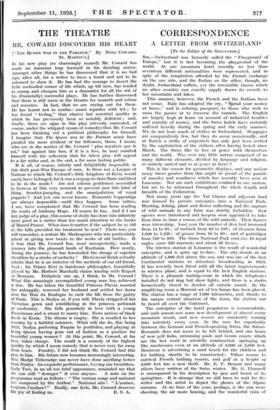THE THEATRE
MR, COWARD DISCOVERS HIS HEART
[" THE QUEEN WAS IN THE PARLOUR." By NOEL COWARD. ST. MARTIN'S.] IN his new play (so charmingly named) Mr. Coward has made an immense leap forward in his dazzling career. Amongst other things he has discovered that it is no bad sign, after all, for a writer to have a heart and not to be ashamed to show it. He has had the courage to desert the little cocktailed corner of life which, up till now, has tended to cramp and cheapen him as a dramatist for all the wit of his (financially) successful plays. He has further discovered that there is still room in the theatre for warmth and colour and romance. In fact, that we are crying out for them. He has learnt not to confuse smart repartee with wit ; he has found " feeling," that elusive but essential quality in which he has previously been so notably deficient ; and, finally, there are signs in this play (cleverly concealed, of course, under the whipped cream of comedy) that Mr. Coward has been thinking out a political philosophy for himself. I imagine that The Queen was in the Parlour must have puzzled the more strident of his followers, those, I mean, who are in the matter of Mr. Coward " plus royaliste que le roi," but against this loss, if it is a loss, he may comfort himself with the reflection that his latest play will appeal to a far wider and, in the end, a *far more lasting public.
It is all, of course, utterly and delightfully impossible in this drab post-War Europe of ours. Is there not a League of Nations to which Mr. Coward's little kingdom of Kreia would surely have belonged, for it was a very up-to-date State and liked to be in the mode ? Are not solemn gentlemen assembled in Geneva at this very moment to prevent just this kind of thing, frontier-jumping, and the manipulation of royal puppets ? And yet, one never knows. Romantic happenings are always impossible—until they happen. Some critics, I see, have complained that Mr. Coward has been reading the works of Anthony Hope. Of course he has. And if I am any judge of a play, this course of study has done him infinitely more good as a writer than too much attention to the books of Marcel Proust. What does it matter if the subject be as old s the hills provided the treatment be new? There was, you will remember, a certain Mr. Shakespeare who was particularly 4droit at giving new twists to the necks of old bottles. It is true that Mr. Coward has, most unexpectedly, made a journey into the pleasant lands of Ruritania. How neatly, during the journey, he has forestalled the shrugs of superior shoulders by a stroke of audacity ! His General Krish actually admits that he is an imitator of the methods of our old friend, Sapt ; his Prince Keri handsome* philosopher, beautifully played by Mr. Herbert Marshall) claims kinship with Rupert of Hentzau. Definitely one up, I think, to Mr. Coward ! What-this amazingly accomplished young man has achieved is this. He has taken the beautiful Princess Flavia, married her unhappily, removed her husband and settled her down near the Bois du Boulogne to suck the life from the gaiety of Paris. This is Nadya or, if you will, Flavia stripped of her Victorian gown and scintillating in the princess petticoat of modernity. She falls genuinely in love with a young Frenchman and is about to marry him. News arrives of black deeds in Kreia. The throne is empty. She is recalled to her country by a faithful minister. What will she do, this being 1926, Nadya preferring Paquin to portfolios, and playing at being Queen having gone out of fashion as a pastime for beautiful young women ? At this point, Mr. Coward, at his best, takes charge. The result is a comedy of the highest quality by which I mean comedy that is never very far away from tears. Frankly, I did not think Mr. Coward had this play in him. His future now becomes increasingly interesting. Miss Madge Titheradge can never have done anything better than Nadya. An exquisite performance, leaving one breathless. Lady Tree, in an all too brief appearance, reminded me that she can still " dowager " it over anyone. A note on the Programme read as follows : " The various songs and national airs composed by the Author." National airs 1 " L'audace, toujours l'audace " Really, one feels, Mr. Coward deserves






































 Previous page
Previous page